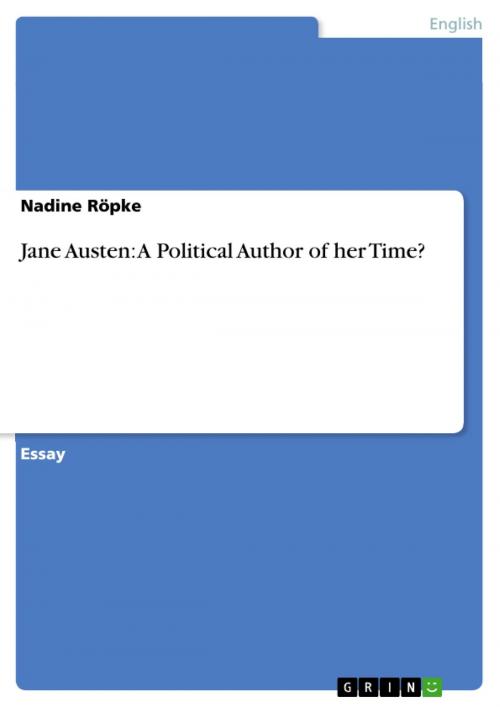Jane Austen: A Political Author of her Time?
Fiction & Literature, Literary Theory & Criticism, British| Author: | Nadine Röpke | ISBN: | 9783638519007 |
| Publisher: | GRIN Publishing | Publication: | July 10, 2006 |
| Imprint: | GRIN Publishing | Language: | English |
| Author: | Nadine Röpke |
| ISBN: | 9783638519007 |
| Publisher: | GRIN Publishing |
| Publication: | July 10, 2006 |
| Imprint: | GRIN Publishing |
| Language: | English |
Essay from the year 2005 in the subject English Language and Literature Studies - Literature, grade: 2,0, University of Birmingham (Department of English Studies), course: Independent Study, 10 entries in the bibliography, language: English, abstract: When Jane Austen wrote her major novels England was in a period of social upheaval provoked by the French Revolution (1789) and the Napoleonic Wars (1793-1817). The achievement of religious freedom in France after the Revolution led to powerful social, political and religious tensions in Great Britain. They reached its heyday when Jane Austen reached adulthood. Thus Austen wrote under the impression of the French Revolution and the resulting British reformist's movements including the feminist movement that called for equal rights for women, the abolitionist movement that supported the abolition of the slave trade and other political reform societies, mostly generated by ordinary working people that declined patronage and called for parliamentary reform, political influence and social equality. The rising tensions among the British society generated the fear among conservatives and the nobility that the French Revolution might spread to Great Britain and deprive the ruling class of their power. One of the most famous anti-revolutionary writers was Edmund Burke. In 1791 he published his pamphletReflections on the Revolution in France,a response to the revolutionary movement, in which he rejected any kind of political reform modelled on the French Revolution. In 1791/92 Thomas Paine replied to Burke's attack on the French Revolution with his pamphletThe Rights of Menwhere he called for social security of the poor, the abolition of The House of Lords, equal political rights for all men and the abolition of the slavery. The book was immediately banned by the British government and Thomas Paine escaped to France a short time after in 1792 and never returned to England again. Nevertheless, Paine's book reached lots of readers and thus fuelled the political debates. The British government as well as the aristocracy and the landed gentry were deeply alarmed by the spread of revolutionary ideas and in order to stern revolutionary potential the government enforced that radical political leaders could be arrested without trial, the distribution of political pamphlets was forbidden, reformist societies eliminated and many reformists were driven into exile. Although the British ruling class managed to suppress a revolution as it had occurred in France they could not circumvent some political reforms that should change the political climate in England forever, like e.g. the universal suffrage with was achieved in 1829.
Essay from the year 2005 in the subject English Language and Literature Studies - Literature, grade: 2,0, University of Birmingham (Department of English Studies), course: Independent Study, 10 entries in the bibliography, language: English, abstract: When Jane Austen wrote her major novels England was in a period of social upheaval provoked by the French Revolution (1789) and the Napoleonic Wars (1793-1817). The achievement of religious freedom in France after the Revolution led to powerful social, political and religious tensions in Great Britain. They reached its heyday when Jane Austen reached adulthood. Thus Austen wrote under the impression of the French Revolution and the resulting British reformist's movements including the feminist movement that called for equal rights for women, the abolitionist movement that supported the abolition of the slave trade and other political reform societies, mostly generated by ordinary working people that declined patronage and called for parliamentary reform, political influence and social equality. The rising tensions among the British society generated the fear among conservatives and the nobility that the French Revolution might spread to Great Britain and deprive the ruling class of their power. One of the most famous anti-revolutionary writers was Edmund Burke. In 1791 he published his pamphletReflections on the Revolution in France,a response to the revolutionary movement, in which he rejected any kind of political reform modelled on the French Revolution. In 1791/92 Thomas Paine replied to Burke's attack on the French Revolution with his pamphletThe Rights of Menwhere he called for social security of the poor, the abolition of The House of Lords, equal political rights for all men and the abolition of the slavery. The book was immediately banned by the British government and Thomas Paine escaped to France a short time after in 1792 and never returned to England again. Nevertheless, Paine's book reached lots of readers and thus fuelled the political debates. The British government as well as the aristocracy and the landed gentry were deeply alarmed by the spread of revolutionary ideas and in order to stern revolutionary potential the government enforced that radical political leaders could be arrested without trial, the distribution of political pamphlets was forbidden, reformist societies eliminated and many reformists were driven into exile. Although the British ruling class managed to suppress a revolution as it had occurred in France they could not circumvent some political reforms that should change the political climate in England forever, like e.g. the universal suffrage with was achieved in 1829.















